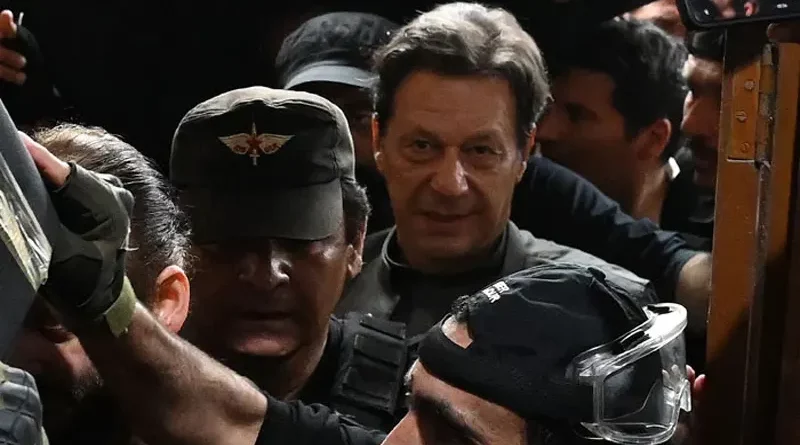IHC grants bail to Imran Khan in Al-Qadir Trust case, bars arrest till May 17
ISLAMABAD: Minutes after granting Imran Khan a two-week protective bail in the Al-Qadir Trust case, the Islamabad High Court (IHC) on Friday also barred authorities concerned from arresting the Pakistan Tehreek-e-Insaf (PTI) chairman till Wednesday (May 17) in any new case filed after May 9.
The IHC granted protective bail to the PTI chairman in the Al-Qadir Trust case hours after he warned of countrywide unrest if he was arrested again.
The former prime minister — who was arrested from the premises of the IHC on Tuesday — was granted 15-day protective bail by a two-member special division bench, comprising Justice Miangul Hassan Aurangzeb and Justice Saman Rafat Imtiaz.
The special division bench was formed by IHC Chief Justice Aamer Farooq to hear the former prime minister’s bail plea a day after Supreme Court termed Khan’s arrest in the Al-Qadir Trust case “unlawful”.
A beaming Khan, sporting a stylish pair of sunglasses, arrived at IHC in tight security like a celebrity, wearing a crisp light-blue shalwar kameez and a dark blue waistcoat, as hundreds of police and paramilitary troops guarded the premises of the judicial structure in the federal capital.
Today’s hearing
At the outset of the hearing — which began after an hour-long delay — the two-member bench expressed its displeasure after lawyers chanted slogans in favour of the former prime minister.
During the first session, Khan — in response to a reporter’s question on whether he was allowed to use a phone during his arrest or not — said: “NAB officials allowed me to talk to my wife via landline.”
The reporter then cross-questioned why Khan contacted Musarrat Cheema when he was given the phone to talk to his wife.
At this Khan clarified that he could not contact his wife.
A reporter further asked whether he had expected to be arrested, to which Khan replied: “I was 100% certain that I would be arrested.”
Following this, the courtroom erupted into slogans in favour of the PTI chief. The courtroom staff tried to stop the chanting; however, they failed to do so. At this, Justice Aurangzeb said that this was “unacceptable”.
Subsequently, the hearing was briefly adjourned for a break for Friday prayers.
Once the hearing resumed, Khan’s lawyer Khawaja Haris presented the PTI chief’s pre-arrest and protective bail applications.
“We have asked for a copy of the inquiry report in another application,” he said, adding that NAB should be ordered to provide a copy of the inquiry report.
Haris said that they had found out about the anti-graft watchdog’s inquiry report from the newspaper, adding that arrest warrants can be issued only if an inquiry turns into an investigation.
“The reason mentioned in the arrest warrants stated that Khan did not appear before NAB despite repeated notices; however, as soon as the investigation started, an attempt was made to arrest him,” he said.
However, the lawyer informed the court that the inquiry had been converted into an investigation in April and that replies to two call-up notices had been submitted.
He then pointed out the legal flaws of the call-up notices and asked: “It is important to state in what capacity the concerned person has been called — as a witness or as an accused.”
In response to a question by Justice Aurangzeb, Haris said he had not visited the NAB office because the call-up notice was “illegal”.
He then concluded his arguments, saying that he had raised objections in a detailed reply, subsequent to which no further notice was received.
After that Islamabad Advocate General Barrister Jahangir Jadoon presented his arguments to the court.
The advocate general defended the government’s decision to bring in the army citing the rising violence in the province, following Khan’s arrest.
He also added that there was no solid reason to bring this matter to the high court in the writ petition. At this Justice Aurangzeb said: “Has martial law been imposed here that we stop hearing all applications?”
Addressing the claims made by Khan’s lawyers, the NAB Deputy Prosecutor General Sardar Muzaffar Abbasi then revealed that the inquiry had started in July after which a call-up notice was issued.
Khan never appeared for the inquiry, he said, adding that notices had also been served to a business tycoon, Zulfi Bukhari, and others.
“Mian Muhammad Soomro, Faisal Vawda, and others who joined the inquiry were also served notices,” he claimed.
After hearing the arguments of both sides, the two-member special division announced its verdict.

